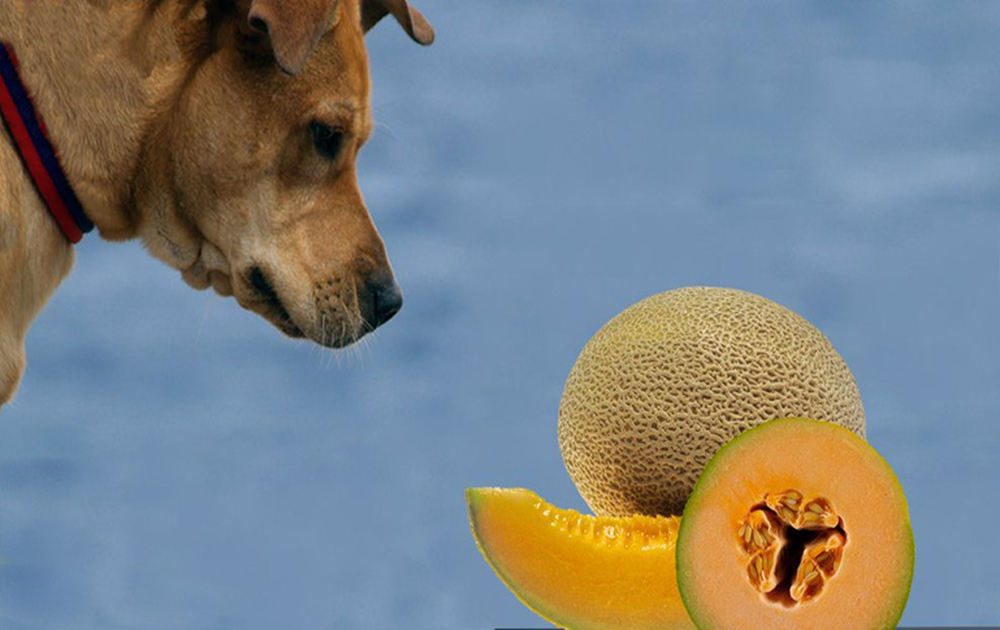It is crucial to ensure the safety of our canine friends, and this includes making educated decisions regarding their nutrition.
It is essential to know which meals are safe for them. We dig into the subject of honeydew and its safety for dogs in this post.
We want to provide pet owners the information they need to choose a healthy diet for their four-legged pets by examining the facts about honeydew intake.
In order to determine if honeydew may be properly included in a dog’s diet, let’s find out the truth about it.
Table of Contents
Nutritional Composition of Honeydew
Honeydew, a delicious and juicy fruit known for its refreshing taste, also offers a range of nutrients that can be beneficial for overall health.
Honeydew is primarily composed of water, making it a hydrating fruit option. In addition to its high water content, honeydew contains several key vitamins and minerals that contribute to its nutritional value.
Let’s take a closer look at the essential nutrients found in honeydew:
1. Vitamins: Honeydew is a rich source of vitamins, particularly vitamin C. Vitamin C is a potent antioxidant that aids in immune function, collagen synthesis, and wound healing.
It also helps in the absorption of iron from plant-based foods. Honeydew also provides small amounts of vitamins A and K, which are essential for vision, cell growth, and blood clotting.
2. Minerals: Honeydew contains several essential minerals that support various bodily functions. Potassium, a vital electrolyte, helps maintain proper heart and muscle function, as well as regulating fluid balance.
Honeydew is also a source of copper, a mineral that contributes to red blood cell formation and collagen production.
It provides small amounts of magnesium, which is important for bone health, energy production, and muscle function.
3. Fiber: While honeydew is not particularly high in fiber, it does contain some dietary fibre. Fiber plays a crucial role in maintaining healthy digestion and promoting regular bowel movements in dogs.
Despite its nutritional benefits, it’s important to note that honeydew should be offered to dogs in moderation due to its sugar content. While naturally occurring sugars in fruits are generally considered healthier than added sugars, excessive sugar intake can lead to weight gain, dental issues, and even diabetes in dogs.

Can Dogs Eat Honeydew?
If you’re a dog owner, you may have wondered if it’s safe to share some of your favorite fruits, like honeydew, with your furry companion. The good news is that honeydew can be a safe and healthy treat for dogs when offered in moderation and prepared appropriately.
Honeydew is a low-calorie fruit that is packed with water, making it a hydrating option for dogs, especially during hot weather. The natural sweetness and refreshing taste of honeydew can make it an appealing and nutritious addition to their diet.
When introducing honeydew to your dog, it’s important to remember a few key considerations:
1. Moderation: While honeydew is generally safe for dogs, it should be given in moderation. Treats, including fruits, should only make up a small portion of your dog’s daily calorie intake. Too much honeydew can lead to an upset stomach, diarrhea, or even weight gain due to its sugar content.
2. Preparation: Before offering honeydew to your dog, ensure that it is thoroughly washed and the rind is removed. The rind can be difficult for dogs to digest and may pose a choking hazard. Additionally, remove any seeds or large pieces that may also present a choking risk.
3. Allergies and Digestive Sensitivities: Like humans, dogs can have individual sensitivities or allergies to certain foods. When introducing honeydew for the first time, offer a small amount and observe your dog for any adverse reactions.
Signs of an allergic reaction may include itching, redness, swelling, or gastrointestinal upset. If you notice any concerning symptoms, consult your veterinarian.
4. High Sugar Content: While honeydew is a natural source of sugar, it’s important to remember that dogs should not consume excessive amounts of sugar. Too much sugar can lead to obesity, dental issues, and other health problems.
Honeydew should be given as an occasional treat rather than a staple in their diet.
Potential Benefits of Honeydew for Dogs
Honeydew, with its juicy and refreshing nature, can offer a range of potential benefits for dogs when incorporated into their diet in moderation. Here are some of the potential advantages of including honeydew as a treat for your furry friend:
1. Hydration: Honeydew has a high water content, which can help keep dogs hydrated, especially during warmer months or after vigorous exercise. Proper hydration is essential for maintaining healthy organ function, regulating body temperature, and supporting overall well-being.
2. Vitamins and Antioxidants: Honeydew is a good source of vitamins, particularly vitamin C. This essential nutrient acts as an antioxidant, supporting the immune system and protecting the body against harmful free radicals. Vitamin C also aids in collagen synthesis, which promotes healthy skin, joints, and connective tissues.
3. Digestive Health: The dietary fiber present in honeydew can contribute to healthy digestion in dogs. Adequate fiber intake supports regular bowel movements, helps prevent constipation, and maintains a healthy gastrointestinal tract. It can also promote the growth of beneficial gut bacteria, contributing to a balanced gut microbiome.
4. Antioxidant Properties: Honeydew contains various antioxidants, including beta-carotene and lutein. These compounds help neutralize free radicals and reduce oxidative stress in the body. By reducing oxidative damage, honeydew’s antioxidants may support cellular health and potentially contribute to a stronger immune system.
5. Low in Calories: Honeydew is a relatively low-calorie fruit, making it a healthier alternative to high-calorie treats. By providing a nutrient-rich snack with fewer calories, you can help maintain your dog’s weight within a healthy range and prevent obesity-related health issues.
Risks and Considerations
It’s important to be aware of certain risks and considerations associated with its consumption. Here are some key factors to keep in mind:
1. Allergies and Sensitivities in Dogs: Just like humans, dogs can develop allergies or sensitivities to certain foods, including honeydew.
When introducing honeydew to your dog’s diet, observe any signs of adverse reactions such as itching, redness, swelling, or gastrointestinal upset. If you notice any concerning symptoms, consult your veterinarian for further guidance.
2. High Sugar Content and its Impact on Dogs: Honeydew, while a natural and healthier source of sugar compared to processed sweets, still contains a significant amount of sugar.
Excessive sugar consumption can contribute to weight gain, dental issues, and may even increase the risk of developing diabetes in dogs. It is crucial to offer honeydew in moderation and consider it as an occasional treat rather than a regular part of their diet.
3. Choking Hazards and Precautions: Honeydew, especially if not properly prepared, can present choking hazards for dogs.
Remove the rind, seeds, and any potential choking hazards before serving small, bite-sized pieces to your furry friend. Supervise their eating to ensure they chew the fruit thoroughly before swallowing.
To mitigate these risks and ensure the safe consumption of honeydew by your dog, consider the following precautions:
- Introduce honeydew gradually into your dog’s diet, starting with small amounts to assess their tolerance and any potential sensitivities.
- Always consult with your veterinarian before introducing any new food into your dog’s diet, especially if they have pre-existing health conditions or dietary restrictions.
- Offer honeydew as an occasional treat, taking into account your dog’s overall calorie intake and nutritional needs.
- Monitor your dog closely when they consume honeydew and be vigilant for any signs of allergies, digestive upset, or choking.
Moderation and Portion Control
It’s important to maintain a balanced diet and ensure that it doesn’t make up a significant portion of your dog’s daily calorie intake. Here’s why moderation and portion control matter:
1. Caloric Intake: Honeydew, like any fruit, contains calories. Feeding your dog excessive amounts of honeydew can contribute to weight gain or even obesity, especially if their overall calorie intake exceeds their energy needs.
To maintain a healthy weight and prevent related health issues, it’s essential to consider the calorie content of honeydew and other foods in their diet.
2. Sugar Content: Honeydew, although a natural source of sugar, still contains sugars that can impact your dog’s health. Overconsumption of sugar can lead to weight gain, dental problems, and potential issues with insulin regulation.
Controlling the portion size of honeydew helps manage their sugar intake and reduces the risk of adverse effects.
3. Balancing Nutritional Intake: While honeydew offers certain vitamins, minerals, and hydration benefits, it should not replace the essential nutrients provided by a well-balanced diet formulated for your dog’s specific needs.
It’s important to consider honeydew as an addition to their regular meals, rather than a substitute for essential nutrients from their main diet.
To practice moderation and portion control effectively:
1. Determine Serving Size: Consult your veterinarian to determine the appropriate serving size of honeydew for your dog based on their size, age, and overall health. Serving sizes can vary depending on the individual dog’s needs.
2. Frequency of Treats: Limit the frequency of honeydew treats to avoid excessive calorie intake. Treats, including honeydew, should only constitute a small portion of your dog’s overall diet. Balance it with other nutritious foods appropriate for their species and breed.
3. Monitor Body Condition: Regularly monitor your dog’s body condition and weight. Adjust the portion sizes of honeydew treats if you notice any changes in their weight, such as weight gain or loss.
4. Consider Individual Factors: Take into account your dog’s activity level, age, and any specific dietary requirements or health conditions they may have. These factors can influence the appropriate portion size and frequency of honeydew treats.

Preparing and Serving Honeydew to Dogs
When offering honeydew to your dog, it’s important to ensure that it is prepared and served in a safe and suitable manner. Here are some guidelines for preparing and serving honeydew to your furry companion:
- Choose Ripe and Fresh Honeydew: Select a ripe honeydew fruit that is fresh and in good condition. Ripe honeydew should have a slightly sweet aroma, a firm texture, and a pale yellow or creamy rind.
- Wash Thoroughly: Before serving honeydew to your dog, make sure to wash it thoroughly to remove any potential dirt, pesticides, or residues. This step helps ensure that your dog consumes clean and safe fruit.
- Remove Rind and Seeds: The rind of honeydew can be tough and difficult for dogs to digest. Peel off the rind and discard it before serving the fruit to your dog. Additionally, remove any seeds or large pieces that may pose a choking hazard.
- Cut into Bite-Sized Pieces: Cut the honeydew into small, bite-sized pieces suitable for your dog’s size and chewing ability. Smaller pieces are easier for your dog to handle and can help prevent choking or swallowing difficulties.
- Serve in Moderation: Honeydew should be served in moderation as a treat or part of a balanced diet. Offer it as an occasional snack, taking into account your dog’s overall calorie intake and nutritional needs. Remember that treats, including honeydew, should only make up a small portion of their daily food intake.
- Observe Your Dog: When serving honeydew to your dog for the first time, observe their response and monitor for any adverse reactions. Some dogs may have individual sensitivities or allergies to certain fruits. If you notice any signs of allergies or digestive upset, discontinue feeding honeydew and consult with your veterinarian.
- Fresh and Stored Properly: Honeydew is best served fresh. If you have leftover honeydew, store it in an airtight container in the refrigerator for a short period. However, keep in mind that honeydew can lose its freshness and quality over time, so it’s best to offer it to your dog within a day or two of preparation.
Signs of Allergic Reactions or Digestive Issues
While honeydew is generally safe for dogs, individual sensitivities can occur. Here are some common signs to watch for:
- Skin Irritation: Allergic reactions in dogs often manifest as skin irritations. Look out for signs such as excessive itching, redness, swelling, or the development of rashes or hives on their skin. Dogs may scratch, lick, or bite at affected areas to relieve discomfort.
- Gastrointestinal Upset: Digestive issues can occur if your dog is sensitive to honeydew or if they consume it in excessive amounts. Watch for symptoms like diarrhea, vomiting, excessive gas, or changes in bowel movements. If you notice persistent gastrointestinal upset, it’s important to consult your veterinarian.
- Respiratory Symptoms: In severe cases of allergies, dogs may experience respiratory symptoms. These can include coughing, sneezing, wheezing, difficulty breathing, or nasal discharge. If your dog exhibits any of these respiratory signs after consuming honeydew, seek veterinary attention immediately.
- Lethargy or Behavioral Changes: Allergic reactions can sometimes lead to generalized discomfort or malaise in dogs. If your dog appears unusually lethargic, exhibits sudden changes in behavior, or seems overall unwell after consuming honeydew, it could indicate an adverse reaction.
- Itchy or Swollen Face: Swelling around the face, particularly the muzzle, lips, or eyes, can indicate an allergic reaction. It may cause your dog’s face to appear puffy or swollen. Additionally, persistent scratching or rubbing of the face can be a sign of discomfort.
Other Safe Fruit Alternatives for Dogs
If you’re looking to offer your dog a variety of fruit options similar to honeydew, there are several safe and dog-friendly choices available. Incorporating a diverse range of fruits into your dog’s diet can provide them with different flavors, textures, and nutritional benefits. Here are some dog-friendly fruits that you can consider:
- Watermelon: Like honeydew, watermelon is hydrating and refreshing for dogs. It contains high water content and is rich in vitamins A and C, as well as beneficial antioxidants. Remove the seeds and rind before serving.
- Cantaloupe: Cantaloupe is another fruit that belongs to the melon family, making it a close relative of honeydew. It is packed with nutrients such as vitamins A and C, as well as fiber. Remove the seeds and rind, and serve in small, bite-sized pieces.
- Blueberries: Blueberries are a nutrient-dense fruit that offers antioxidants, vitamins, and fiber. They can be served fresh or frozen, providing a tasty and healthy snack for dogs. Blueberries are small and can be given whole or mixed into their regular food.
- Strawberries: Strawberries are a sweet and delicious fruit that many dogs enjoy. They are a good source of vitamin C, fiber, and antioxidants. Remove the green tops and cut into small, manageable pieces before offering them to your dog.
- Pineapple: Pineapple is a tropical fruit that can provide dogs with a dose of vitamins, minerals, and enzymes. It contains bromelain, an enzyme that may have anti-inflammatory properties. Remove the tough outer skin and the hard core before serving.
Frequently Asked Questions
1. Can dogs eat honeydew seeds?
Answer: It’s best to remove the seeds before offering honeydew to your dog. The seeds can pose a choking hazard and are difficult for dogs to digest.
2. How much honeydew can I feed my dog?
Answer: Honeydew should be fed in moderation. The appropriate portion size depends on your dog’s size, weight, and individual nutritional needs. Consult with your veterinarian for specific guidelines.
3. Is honeydew safe for puppies?
Answer: Honeydew can be safe for puppies when given in small, bite-sized pieces. However, it’s important to introduce new foods gradually and monitor their response for any allergic reactions or digestive issues.
4. Can dogs with diabetes eat honeydew?
Answer: Honeydew contains natural sugars and should be given in limited quantities to dogs with diabetes. It’s crucial to consult with your veterinarian to determine if honeydew is suitable for your dog’s specific condition and dietary restrictions.
5. Are all parts of the honeydew plant safe for dogs?
Answer: No, not all parts of the honeydew plant are safe for dogs. Only the ripe fruit itself is safe for consumption. The rind and seeds should be removed, as they can be difficult to digest and pose a choking hazard.
Conclusion
Honeydew can be a safe and enjoyable treat for dogs when served in moderation and prepared properly. It offers hydration, vitamins, minerals, and potential health benefits.
It’s important to be mindful of potential risks, such as allergies, high sugar content, and choking hazards. Every dog is unique, so it’s essential to monitor their response to honeydew and consult with a veterinarian if you have any concerns.
By considering your dog’s individual needs, practicing moderation, and incorporating a variety of safe fruits into their diet, you can provide them with a balanced and nutritious culinary experience

I’m David, an expert contributor and writer, with two furry friends of my own, I know the challenges of raising and caring for dogs. From training to nutrition and health, my goal is to provide valuable insights and advice to help create strong bonds and happy, healthy lives. Find me in Twitter.




